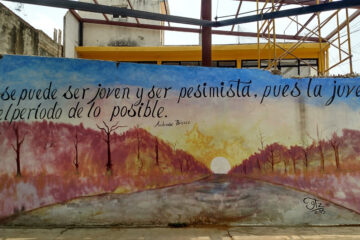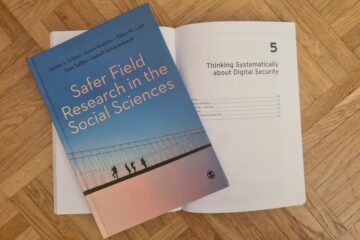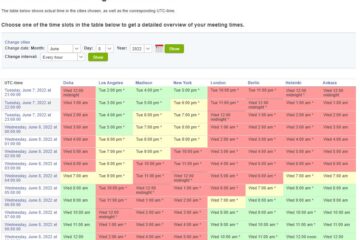by Tonya Dodez, Indiana University
Many scholars often face significant logistical and empirical limitations on the “best case scenario” execution of their research projects. Both progress and setbacks are inherent parts of the research process. While the COVID-19 pandemic disrupted fieldwork for many researchers, the challenges it generated have been faced before by scholars who 1) cannot make it into the field due to financial limitations, safety concerns, family obligations, or other practical issues and/or 2) must redesign a project that has become unfeasible to execute effectively. Whether a global pandemic or other practical impediments generate a crisis of research design (LaPorte 2014), all hope is not lost. Even faced with no choice but to redesign a research plan or refocus a topic of study, there are many options to be explored before abandoning a project of passion. In this reflection I highlight these points by discussing my own experiences with redesigning dissertation research and coping with the challenges of disrupted fieldwork.
Initial Lessons from the Field
My first significant experience with being forced to redesign a research project occurred during my pre-dissertation fieldwork in Dakar, Senegal during the summer of 2018. During this brief stay, I learned many hard lessons. But the most significant, and initially disappointing, realization was that my research project – which sought to understand the impact of experiences with clientelism and corruption for different types of voters – was likely not going to be viable. Even in Dakar, a large, cosmopolitan capital city where anonymity could be achieved, people were often averse to discussing corruption with any amount of specificity. I quickly learned that having such conversations, particularly in rural areas, would be impossible.
Following this initial fieldwork, I struggled to refocus my intellectual interests. My passion for elections and fascination with the dynamics of political violence, eventually centered my research toward the topic of electoral violence and its consequences for voters. My research now seeks to understand how voters are actually affected by electoral violence and intimidation and what actions are available to them to hold those who use violence accountable.

Scenes from Gorée – a beautiful island off the coast of Dakar
Another important component of my revised project came from revisiting research notes from my fieldwork in Senegal. Specifically, interviews and participant observation notes highlighted two interesting patterns among Senegalese voters: 1) frequent engagement in a variety of civic participation activities and 2) both willingness and excitement when discussing how those activities shaped their perceptions of elections and democratic accountability. This led me to question whether certain forms of civic engagement shape both how voters perceive instances of political violence, and their subsequent voting behavior. For my project, Senegal would not only represent an important case for studying electoral violence, as some degree of electoral violence and intimidation occurs in most elections but would also provide some important insight into the social capital that citizens gain from civic engagement and the variation in political efficacy that can be derived from different types of political action within civil society organizations (CSOs). My research would employ a mixed methods approach. I would first analyze the interactive effects of various civic engagement activities and electoral violence on voting behavior quantitatively using Afrobarometer survey data across several sub-Saharan African countries. For the qualitative portion of the project, I intended to conduct roughly 80 interviews and focus groups in two cities in Senegal where considerable variation in independent variables existed, to unpack the causal mechanisms of civic engagement that lead to different perceptions of violence, and therefore responses.
After earning several grants to fund my field research, I prepared to conduct fieldwork in the summer of 2020 in Senegal. I established a place to stay through contacts from pre-dissertation fieldwork and acquired enough funding to hire a Senegalese RA to help conduct interviews and moderate focus groups and to cover transcription costs.
I was right on track to proceed with my project. Everything was falling into place, and I was a plane ticket purchase away from beginning my fieldwork. And then the COVID-19 pandemic hit.
Senegal, like many other sub-Saharan African countries concerned about the devastation that the novel coronavirus could impose on their already fragile healthcare systems, imposed strict lockdown measures and closed their borders by March 2020. These restrictions made fieldwork completely impossible.
Initially, I adopted a wait-and-see approach. I thought to myself, “Maybe travel would become safe again if we all just sheltered in place for a bit.” A month passed. And then another, and it became apparent that this virus wasn’t going anywhere anytime soon. This would necessitate, yet another, significant redesign of my dissertation research.
Place a primacy on what is « do-able » rather than what is no longer possible
The realization that I had to restructure the main focuses of my project and change my research plan, was overwhelming to say the least. The most helpful advice I received initially when deciding the extent to which I would need to redesign the project was to break the project into “do-able” components. In my case, this would mean feasible dissertation chapters based on the evidence I knew was already available.
The questions I asked myself when adjusting my focus and re-evaluating my dissertation chapters: What was still observable without fieldwork? What concepts could still be captured with existing data, and how effectively? What could I leverage exclusively from quantitative analyses and what was still left unanswered? Based on the digital fieldwork I could do, what contribution to the larger project did I expect an examination of Senegal to make?
The answers to these questions led to my decision to redirect the main focus and contribution of the project to place a greater emphasis on conceptual refinement and nuances in measurement concerning electoral violence – more chapters would rely on quantitative methodologies with existing data than those that relied on the qualitative case-specific focus on Senegal. I would also explore some digital fieldwork alternatives, but now with the intent of supplementing findings from existing data rather than being the main contribution to the project.

Celebrating la Korité in Dakar
Redirecting the main point of emphasis
I decided to reorient my focus to rely less heavily on the civic engagement contribution of the project by emphasizing more the refinement of the concept and measurement of electoral violence. Taking another deep dive into the literature to look at how previous studies conceptualized and measured electoral violence and intimidation and what existing data they used to develop these measures, led me to two conclusions. First, there is a great deal of accessible, existing data on the phenomena of electoral violence, and more than I initially realized. Second, further conceptual refinement of electoral violence has theoretical implications for voting behavior and electoral outcomes that have not previously been considered. Further, these distinctions could be captured with existing quantitative and qualitative data to allow for some nuances to be developed in my theoretical story which can be empirically demonstrated. This allowed me to begin structuring my project in a way that relied less heavily on the civic engagement components, since this would be the more challenging contribution to make in the absence of in-person fieldwork.
By reorienting the focus to not just be a story about civic engagement, but about how different tactics of electoral violence and intimidation may affect voters differently, I found a contribution to make with existing data. In addition to using survey data from Afrobarometer to examine how some aspects of civic engagement may mediate the effects of violence, my project would now also demonstrate how different types of violence and intimidation can elicit different patterns in voting behavior and ultimately different electoral outcomes, making the overall worth of my project less reliant on findings from the field.
Qualitative data collection alternatives
Many researchers do not get the opportunity to conduct in-person fieldwork, even when there is no global pandemic. Traveling to a field site and collecting original data requires considerable money and time, which many researchers, particularly graduate students, do not have. Still, viable alternatives to in-person fieldwork exist and have indeed been used by many who have completed successful projects. I frequently reminded myself of this fact when redesigning my research plan. While my ideal project was no longer possible, investigating potential online sources and virtual data collection methods illuminated possibilities that would allow me to retain the case-specific focus on Senegal as at least a partial component of the project.
Virtual interviews and focus groups: Based on the original methods for data collection that I had intended to use, conducting interviews and focus groups via Zoom, Skype, WhatsApp, etc. was at least one possible alternative, but not without some significant drawbacks. The first and most obvious issue with relying exclusively on virtual interviews would be the inevitable bias in the sample of my respondents. Even in Senegal’s capital city, Dakar, most households do not have access to a home computer or laptop. Further, while the majority of adults living in Dakar have a mobile phone, far fewer own a smart phone that would allow for these virtual interactions. Those who I would be able to interview, would therefore be limited to more well-off individuals and/or those in positions of authority. While this was less than ideal, it did not necessarily mean there was no other evidence to be obtained from more elite-focused interviews. These interviews would not be able to provide direct evidence of the average voter’s perspectives. But I decided that insights from local politicians, civil society leaders, and more affluent Senegalese citizens could partially contribute to the qualitative story I was trying to illustrate.
Social Media and CSO Websites: Since my project examines mediating impacts of civic activism and participation in civil society on individual perceptions, observing the goals, objectives, and motives of civil society organizations themselves was another point of variation that I discovered would be possible through virtual outlets. After identifying several active CSOs operating in Senegal, I looked into online sources that could tell me something about the primary objectives of these organizations, the scale and diversity of their membership, their most prominent accomplishments, etc. I found that several of these CSOs had quite informative websites, and with that, many had Facebook and Twitter accounts as a platform for disseminating information to their members. These forums provided a virtual way to see, not only the organizations’ main agendas and primary objectives, but how those engaged with these organizations (at least online) perceive and react to these agendas. For the purposes of my project, social media platforms provided an important source of evidence due to the high accessibility and breadth of content. While this would yield similar biases to virtual interviews since these online outlets for civic engagement would only be accessible to those owning computers or smartphones (and largely be limited to a younger population), this could still function as a complementary source of evidence.

Virtual fieldwork from the home office
While these virtual methods would have drawbacks as stand-alone evidence, triangulating multiple digital sources would reflect different components of the causal story I was illustrating. Further, since I had decided to refocus the primary contribution of the project, the evidence obtained from this digital fieldwork would be intended more as a supplement to the quantitative evidence.
The central point that I would hope anyone facing a crisis of research design would take away from my story is that not all hope is lost. There are many options to be explored and considered before throwing out a project of intellectual passion. When the COVID-19 pandemic began, I initially spent a considerable amount of time investigating different research questions I could be asking, assuming the answers to my original question would be impossible to obtain without in-person fieldwork. This was not a terribly useful endeavor, and, in hindsight, my time would have been best served exhausting all other options before trying to abandon a project I cared so much about. There are many alternatives to in-person fieldwork; far more, in fact, than I was initially aware or even discussed in this essay. We have considerably more data at our fingertips than I think many of us even realize, particularly in this era of information abundance. Life happens and it can be unpredictable. When conducting research, challenges and setbacks are inevitable. While it is important to be realistic, we still can remain hopeful, creative, and resilient in pursuing our intellectual passions.
References:
LaPorte, Jody. (2014). “Confronting a Crisis in Research Design.” PS, 414-417.


